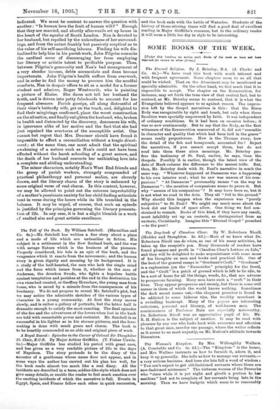The Eternal Religion. By J. Brierley, B.A. (J. Clarke and
Co. 6s.)—We have read this book with much interest and with frequent agreement. Some chapters seem to us all that could be wished. That on the Atonement. may be mentioned as specially admirable. On the other hand, we find much that it is impossible to accept. The chapter on the Resurrection, for instance, may set forth the true view of that central fact, but to contend, as Mr. Brierley seems to contend, that it is what the Evangelists believed appears to us against reason. The impres- sion left by the Gospel narratives is this : that the Risen Body was recognisable by sight and touch, but only when these faculties were specially empowered by faith. It was independent of ordinary conditions. So it had been on occasion before ; it was so now continuously. But to say that the Body, as the first witnesses of the Resurrection conceived of it, did not "resemble in character and quality that which had been laid in the grave" seems really preposterous. How is the Thomas story, how the detail of the fish and honeycomb, accounted for ? Reject the narratives, if you cannot accept them, but do not read into them these alien meanings. Mr. Brierley pre- fers the testimony of St. Paul, earlier, he says, than the Gospels. Possibly it is earlier, though the latest view of • the date of Mark reduces the difference to the merest trifle. But, then, Mr. Brierley deals with St. Paul's narrative in much the same way. "Whatever happened at Damascus was a happening to his own interior soul ; what he saw was unseen of his com- panions." "At Damascus" presumably means "on the way to Damascus " : the mention of companions seems to prove it. But why "unseen of his companions " ? It may have been so, but it is not what we read in the Acts. They all "fell to the ground." Why should this happen when the experience was "purely subjective" to St. Paul ? We might say much more about the book did our limits of space allow. One thing we feel con- strained to remark. Books of this kind, if they have any result, must infallibly set up an esoteric, as distinguished from an exoteric, Christianity. Imagine this "Eternal Gospel" preached —to the poor !


































































 Previous page
Previous page